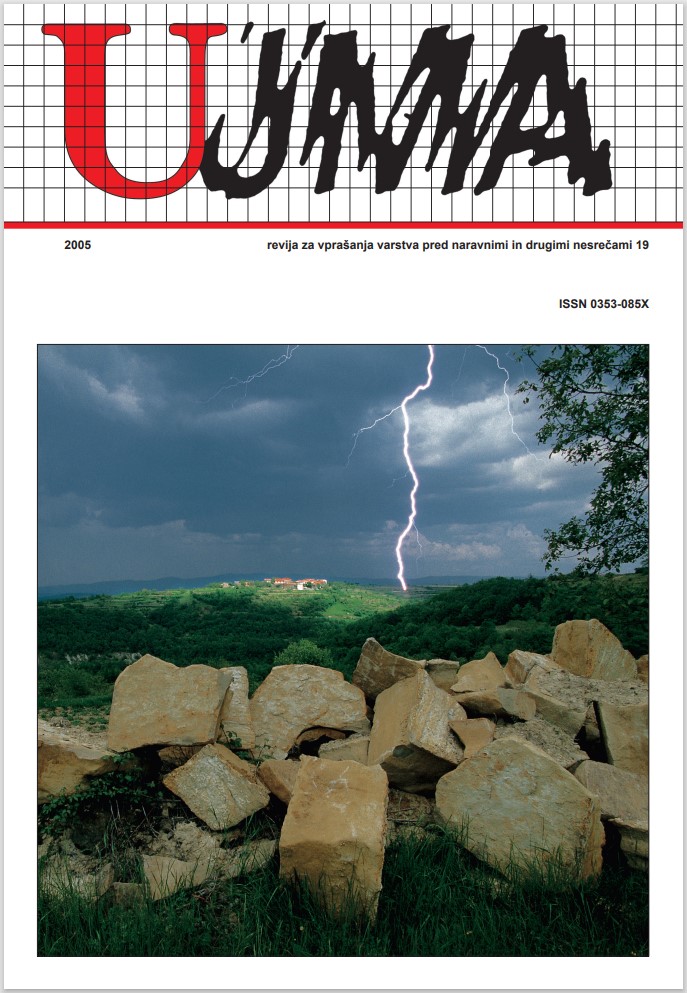TIPIČNE TEŽAVE PRI KRIZNEM UPRAVLJANJU
Povzetek
Pri kriznem upravljanju se iz najrazličnejših razlogov pojavlja cela vrsta težav, ki jih moramo upoštevati pri snovanju sodobnega nacionalnega sistema kriznega upravljanja. Tako med zbiranjem podatkov in kriznim opozarjanjem prihaja predvsem do težav v zvezi s preveliko ali premajhno količino zbranih informacij in zanemarjanjem oziroma neupoštevanjem zgodnjih kriznih kazalcev. V fazi kriznega načrtovanja prihaja do težav v zvezi z neustreznostjo načrtov, sindromom vedno uspešnih vaj, ki ne opozarjajo na pomanjkljivosti, in omejenim interesom ustreznih odločevalcev za sodelovanje na vajah kriznega upravljanja. Pri fazi kriznega odločanja je opozorjeno na veliko število medorganizacijskih težav, med katerimi imajo ključno mesto strateško izogibanje odgovornosti, vprašanje nejasne odgovornosti, različne organizacijske kulture, vprašanje koordiniranja koordinatorjev, medorganizacijsko tekmovanje in konflikt itd. V fazi pokriznega učenja pa pride do izraza predvsem težava selektivnega učenja. Članek je kratka analiza izpostavljenih težav po posameznih fazah kriznega upravljanja.
Literatura
Alter, C. in Hage, J., 1993. Organizations Working Together. Sage Publications, London.
Boin, A., in Lagadec, P., 2000. Preparing for the Future: Critical Challenges in Crisis Management. Journal of Contingencies and Crisis Management Research, let. 8, št. 4.
Castenfors, K., 2001. Diagnosing Crisis Management: Presentation of an Instrument for Diagnostic Observation and Inquiry into Peacetime Social Crises. Swedish Defence Research Agency, Stockholm.
Cockell, J., 1998. Toward Response-Oriented Early Warning Analysis. V: Davies, J., in Gurr, T. R. (ur.): Preventive Measures: Building Risk Assessment and Crisis Early Warning Systems. Rowman & Littlefield Publishers, Lanham.
Davies, J., in Gurr, T. R., 1998. Preventive Measures: Building Risk Assessment and Crisis Early Warning Systems. Rowman & Littlefield Publishers, Lanham.
Dimitrichev, A., 1998. The Role of Early Warning. V: Davies, J., in Gurr, T. R. (ur.): Preventive Measures: Building Risk Assessment and Crisis Early Warning Systems. Rowman & Littlefield Publishers, Lanham.
Dixon, J., 1984. National Security Policy Formulation: Institutions, Processes, and Issues. National Defense University, Washington D.C.
Gentry, J., 2000. Complex Civil-Military Operations. Naval War College Review, let. 53, št. 4.
Granot, H., 1999. Emergency Interorganizational Relationships. Disaster Prevention and Management, let. 8, št. 1.
Heinzen, B., 1996. Crisis Management and Scenarios: the Search for an Appropriate Methodology. Ministry of Home Affairs, The Hague.
Hillyard, M., 2000. Public Crisis Management: How and Why Organizations Work Together to Solve Society’s Most Threathening Problems. Writers Club Press, San Jose.
Jefferson, C., 1998. Information Sharing and Early Warning. V: Davies, J., in Gurr, T. R. (ur.): Preventive Measures: Building Risk Assessment and Crisis Early Warning Systems. Rowman & Littlefield Publishers, Lanham.
Jervis, R., 1997. Complex Systems: the Role of Interactions. V: Alberts, D., in Czerwinski, T. (ur.): Complexity, Global Politics, and National Security. National Defense University, Washington, D.C.
Korac - Boisvert, N., in Kouzmin, A., 1994. The Dark Side of Info-Age Social Networks in Public Organizations and Creeping Crises. Administrative Theory and Praxis, let. 16, št. 1.
Malešič, M., 2003. Uvod – Vsebinska in metodološka izhodišča raziskave. V: Malešič, M., Polič, M., Prezelj, I., et al.: Poročilo raziskovalnega projekta Upravljanje in vodenje v kriznih razmerah. FDV, Ljubljana.
Maxfield, R., 1997. Complexity and Organization Management. V: Alberts, D., in Czerwinski, T. (ur.): Complexity, Global Politics, and National Security. National Defense University, Washington, D.C.
Mitroff, I., 1994. The Role of Computers and Decision Aids in Crisis Management: A Developer’s Report. Journal of Contingencies and Crisis Management Research, let. 2, št. 2.
Payne, C., 1999. Contingency Plan Excercises. Disaster Prevention and Management, let. 8, št. 2.
Prezelj, I., 2004. Sistem kriznega menedžmenta v sodobni državi. FDV, doktorska disertacija.
Peters, G., 2001. Concepts and Theories of Horizontal Policy Management. Paper presented at the Conference on Policy Coordination, April, Taipei.
Quarantelli, E., 1989. How Indivuduas and GroupsReact During Disasters: Planning and Managing Implications for EMS Delivery. DRC Paper, University of Delaware, Newark.
Quarantelli, E., 2000. Disaster Planning, Emergency Management and Civil Proitection: the Historical Development of Organized Efforts to Plan and to Respond to Disasters. DRC Paper, University of Delaware, Newark.
Rosenthal, U., 1986. Nine Dilemmas of Crisis Management. V: Proceedings from the International Conference on Crisis Management at the National Level. March 20–22, Stockholm.
Rosenthal, U., in Kouzmin, A., 1997. Crises and Crisis Management: Toward Comprehensive Government Decision Making. Journal of Pubic Administration Research & Theory, let. 7. št. 1.
Rosenthal, U., Charles, M., in T’Hart, P., 1989. The World of Crisis and Crisis Management. V: Rosenthal, U., in T’Hart, P. (ur.): Coping with Crises: The Management of Disaster, Riots and Terrorism. Charles Thomas, Springfield.
Rosenthal, U., Charles, M., T’Hart, P., Kouzmin, A., in Jarman, A., 1989. From Case Studies to Theory and Recommendations: A Concluding Analysis. V: Rosenthal, U. in T’Hart, P. (ur.): Coping with Crises: The Management of Disaster, Riots and Terrorism. Charles Thomas, Springfield.
Russet, B., in Starr, H., 1996. World Politics: The Menu for Choice. W. H. Freeman and Company, New York.
Salmon, T., in Alkadari, R., 1992. Crises, Crisis Management and Crisis Prevention. V: Carey, R., in Salmon, T. (ur.): International Security in the Modern World, St. Martin’s Press, New York.
Sourbag, B., 1995. The Use of Scenarios by Government for Crisis Management, The Use of Scenarios for Crisis Management, Crisis Management and Fire Service Directorate, The Hague.
Stern, E., 1999. Crisis Decisionmaking: A Cognitive Institutional Approach. Universtiy of Stockholm, Stockholm.
T’Hart, P., 1996. Simulations and Scenarios in Crisis Management Planning. V: Proceedings from the International Conference on Crisis Management at the National Level. March 20–22, Stockholm.
T’Hart, P., Rosenthal, U., in Kouzmin, A., 1993. Crisis Decision Making: The Centralization Thesis Revisited. Administration & Society, let. 25, št. 1.
Prenosi
Objavljeno
Številka
Rubrike
Licenca

To delo je licencirano pod Creative Commons Priznanje avtorstva-Nekomercialno-Brez predelav 4.0 mednarodno licenco.
Članki so na voljo javnosti pod licenco Creative Commons Priznanje avtorstva-Nekomercialno-Brez predelav 4.0 Mednarodna (CC BY-NC-ND 4.0).


